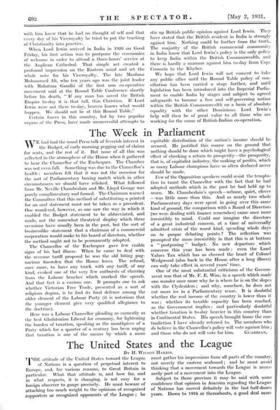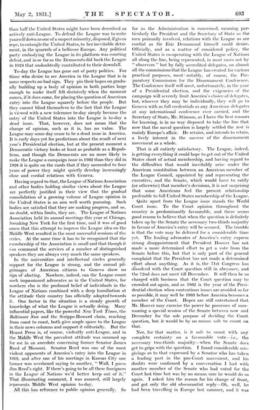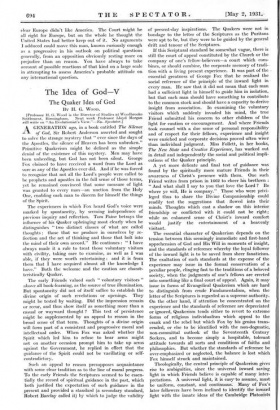The United States and the League
BY H. WILSON HARRIS.
THE attitude of the United States toward the League of Nations is a question of perpetual interest to Europe, and, for various reasons, to Great Britain in particular. What that attitude is, and how far, and in what respects, it is Changing, is not easy for a foreign observer to gauge precisely. He must beware of attaching too much weight to the opinions of recognized supporters or recognized opponents of the League ; he must gather his impressions from all parts of the country, not merely the eastern seaboard ; and he must avoid thinking that a movement towards the League is neces- sarily part of a movement into the League.
Subject to those provisos it may -be said with some confidence that opinion in America regarding the League of Nations has moved definitely in the last half-dozen years. Down to 1924 or thereabouts, a good deal more than half the United States might have been described as actively anti-League. To defend the League was to write yourself down as one of a suspect minority, disposed, if given rope, to entangle the United States, to her inevitable detri- ment, in the quarrels of a bellicose Europe. Any political party embodying the League in its platform was courting defeat, and in so far as the Democrats did back the League in 1924 that undoubtedly contributed to their downfall.
To-day the League has gone out of party politics. For those who desire to see America in the League that is in some respects no bad sign. They pin their hopes on gradu- ally building up a body of opinion in both parties large enough to make itself felt decisively when the moment comes, if it does come, for placing the question of American entry into the League squarely before the people. But they cannot blind themselves to the fact that the League is viewed with a new tolerance to-day simply because the entry of the United States into the League is to-day a dead issue. That, however, does not mean that the change of opinion, such as it is, has no value. The League may some day cease to be a dead issue in America. It is early days yet for predictions about the result of next year's Presidential election, but at the present moment a Democratic victory looks at least as probable as a Repub- lican, and though the Democrats are no more likely to make the League a campaign issue in 1932 than they did in 1928 it is quite on the cards that if they succeeded to four years of power they might quietly develop increasingly close and cordial relations with Geneva.
Having regard to that, the League of Nations Association and other bodies holding similar views about the League are perfectly justified in their view that the gradual consolidation of a growing volume of League opinion in the United States is an aim well worth pursuing. Such bodies are satisfied that they are making progress, and so, no doubt, within-limits, they are. The League of Nations Association held its annual meetings this year at Chicago, forsaking New Ynrk for the first time, and it was of good omen that this attempt to impress the League idea on the Middle West resulted in the most successful sessions of the eeries. At-the same time it has to be recognized that the membership of the Association is small and that though it Can command the services of a number of distinguished speakers they are always very much the same speakers.
In the universities and intellectual circles generally support for the League is strong, and the• annual pil- grimages of American citizens to Geneva show no sign of abating. Nowhere, indeed, can the League count such impassioned advocates as in the United States, for nowhere else is the profound belief of individuals in the League of Nations combined with a deep humiliation at the attitude their country has officially adopted towards it. One factor in the situation is a steady growth of knowledge of what the League is actually doing. Many influential papers, like the powerful New York Times, the Baltimore Sun and the Scripps-Howard chain, reaching from coast to coast, both give ample space to the League in their news columns and support it editorially. But the Hearst Press is, of course, violently anti-League, and in the Middle West the prevalent attitude was summed up for me in an anecdote concerning former Senator James Reed of Missouri. Senator Reed was one of the most violent opponents of America's entry into the League in 1919, and after one of his meetings in Kansas City one farmer was overheard saying to another, "Wall, I guess Jim Reed's right. If there's going to be all these foreigners in the- of Nations we'd better keep out of it." That luminating comment, I was assured, still largely represents Middle West opinion to-day. All ,t1;iis has reference .to public opinion generally. So far as the Administration is concerned, meaning par- ticularly the President and the Secretary of 'State as the men primarily involved, relations with the League as are cordial as Sir Eric Drummond himself could desire. Officially, and as a matter of considered policy, the United States is co-operating with the League of Nations all along the line, being represented, in most cases not by " observers " but by fully accredited delegates, -on almost all the commissions that the League has created for various practical purposes, most • notably, of course, the Pre- paratory Commission for the Disarmament Conference. The Conference itself will meet, unfortunately, in the year of a Presidential election, and the exigencies of the campaign will severely limit America's choice of delegates, but, whoever they may be individually, they will go to Geneva with as full credentials as any American delegates at any international conference ever carried, and the Secretary of State, Mr. Stimson, as I have the best reasons for knowing, is in no way disposed to take the line that now that the naval question is largely settled the rest is mainly Europe's affair. He retains, and intends to retain, a lively interest in the success of the disarmament movement as a whole.
That is all entirely satisfactory. The League, indeed, is getting everything it could hope to get out of the United States short of actual membership, and having regard to 'the difficulties that would inevitably arise under the American constitution between art American member of the League Council, appointed by and representing the executive, and the Senate, which would have to ratify (or otherwise) that member's decisions, it is not surprising that some . Americans feel the present relationship preferable to full United States membership of the League.
Quite apart from the League issue stands the World Court issue. To the Court opinion throughout the country is predominantly favourable, and there seems .good reason to believe that when the question is definitely taken up by the Senate the necessary two-thirds majority in favour of America's entry will be secured. The trouble is that the vote may be deferred for a considerable time yet. The leading advocates of America's entry express strong disappointment that President Hoover has not made a more determined effort to get a vote from the Senate before this, but that is only part of the general complaint that the President has not made a determined effort about anything. As it is, the 71st Congress has dissolved with the Court question still in abeyance, and the 72nd does not meet till December. It will then be so charged with business that the Court question may be crowded out again-, and as 1982 is the year of the Presi- dential election when contentious issues are avoided so far as possible, it may well be 1988 before America becomes a member of the Court. Hopes are still entertained that Mr. Hoover may exercise the power he possesses of sum- moning a special session of the Senate between now and December for the sole purpose- of deciding the Court question, but it would be by no means safe to count on that.
Nor, for that matter, is it safe to count with any complete certainty on a favourable vote—i.e., the necessary two-thirds majority-when the Senate does get to grips with the question. I found considerable mis- givings as to that expressed by a Senator who has taken a leading part in the pro-Court movenlent, and his 'doubts were confirmed by a conversation I had with another member of the Senate who had voted for the Court last time but was by no means sure he would do so again. I asked him the reason for his change of front, and got only the old obscurantist reply—Oh, well, he had been travellini. in Europe list summer, and it was clear Europe didn't like America. The Court might be all right for Europe, but on the whole he thought the United States had better keep out of it. No arguments I adduced could move this man, known curiously enough as a progressive in his outlook on political questions generally, from an opposition obviously resting more on prejudice than on reason. You have always to take account of possible reactions of that kind on a large scale in attempting to assess America's probable attitude on any international question.






































 Previous page
Previous page